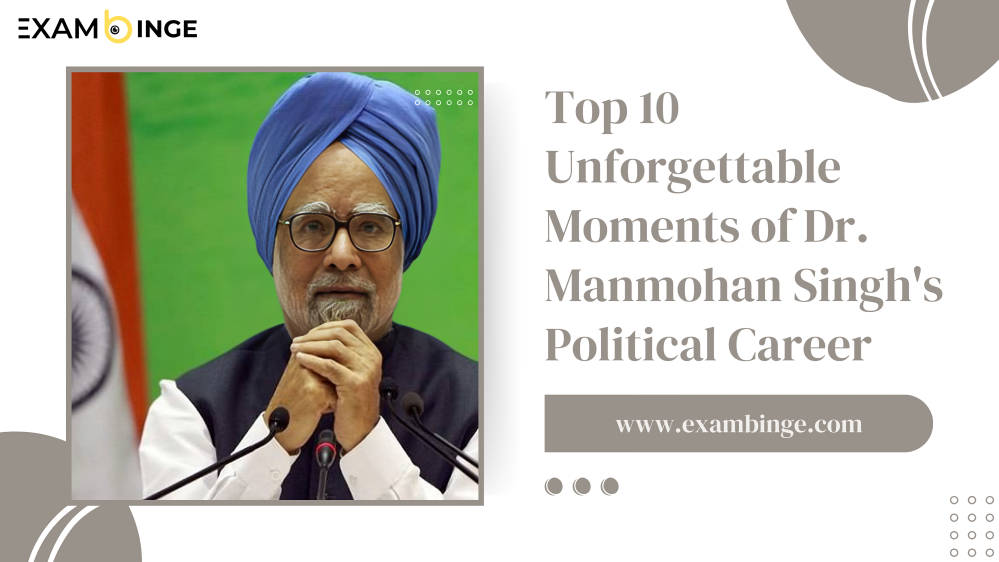Dr. Manmohan Singh’s political career is marked by several unforgettable moments that have left a lasting impact on India and the world. From spearheading India’s economic reforms in 1991 to playing a crucial role in global diplomacy, his leadership has shaped the course of modern India. In this blog, we’ll explore the top 10 unforgettable moments of Dr. Manmohan Singh’s political career, reflecting on the decisions and milestones that defined his time as India’s Prime Minister and Finance Minister.
1. The 1991 Economic Reforms: A Turning Point in India’s History
Dr. Manmohan Singh’s most iconic moment came in 1991 when he was appointed the Finance Minister of India under Prime Minister P.V. Narasimha Rao. During this time, India was facing a severe economic crisis, with high inflation, a depreciating rupee, and a balance of payments problem. Dr. Singh, with his profound understanding of economics, spearheaded the landmark economic liberalization reforms. These reforms included devaluing the rupee, reducing tariffs, privatizing state-owned enterprises, and opening up the Indian economy to global markets.
This bold move turned India’s economy around, spurring growth, attracting foreign investments, and transforming India into one of the fastest-growing economies in the world. The 1991 reforms are widely regarded as the foundation of India’s modern economic success.
2. The Nuclear Deal (2005-2008): India’s Global Leap
Dr. Singh’s tenure as Prime Minister saw one of the most significant diplomatic milestones in India’s history: the Indo-US Nuclear Deal. Signed in 2005 and ratified in 2008, this agreement allowed India to access civilian nuclear technology and energy, despite not being a signatory to the Non-Proliferation Treaty (NPT).
The deal was a testament to Dr. Singh’s skill in navigating international diplomacy. Despite opposition from political parties and concerns over national security, Dr. Singh successfully secured India’s energy future, while simultaneously strengthening its ties with the United States and positioning India as a global power.
3. The Global Financial Crisis (2008): Steady Leadership in a Storm
In 2008, the world witnessed one of the worst financial crises since the Great Depression. The global financial meltdown impacted many nations, including India. However, under Dr. Singh’s leadership, India was able to weather the storm with minimal damage.
Dr. Singh, a trained economist, implemented measures that included fiscal stimulus packages, easing credit, and maintaining a focus on growth. His calm, strategic approach helped India navigate through the crisis without slipping into a recession, earning him praise for his steady leadership during turbulent times.
4. The 2004 General Elections: The Unexpected Victory
In 2004, Dr. Manmohan Singh’s political journey reached a pivotal moment when the Congress Party, under the leadership of Sonia Gandhi, unexpectedly won the Indian general elections. Despite the fact that Sonia Gandhi was the natural choice for the role of Prime Minister, she declined the position, and Dr. Singh was chosen to lead the country.
This moment was a turning point for Dr. Singh, as he became the first Prime Minister of India who had no political background in terms of grassroots leadership. His appointment was a bold move, marking the start of a decade-long period of growth and reforms under his leadership.
5. The Economic Growth of the 2000s: India Becomes a Global Player
Under Dr. Singh’s leadership, India witnessed an economic boom in the 2000s. The country’s GDP grew at an impressive rate, foreign investments surged, and the nation was recognized globally as an emerging economic powerhouse.
Dr. Singh’s economic policies, including boosting infrastructure, expanding the service sector, and increasing foreign trade, were crucial to India’s rise as a global player in the 21st century. His leadership turned India into one of the fastest-growing economies, which attracted attention from international business leaders, making India a key player in global economic discussions.
6. The 2008 Terror Attack on Mumbai: A Defining Moment of National Unity
While Dr. Singh’s tenure was marked by economic success, it was also shaped by challenges that tested the nation’s unity. One such event was the 2008 Mumbai terrorist attacks, which left the nation shaken. Dr. Singh, displaying his leadership qualities, stood united with the people of India, offering condolences and taking decisive actions against terrorism.
His call for international cooperation to combat terrorism and the strengthening of India’s security apparatus were pivotal in ensuring that the nation stood strong in the face of adversity.
7. The Food Security Act (2013): Ensuring a Right to Food
In 2013, Dr. Singh’s government passed the landmark Food Security Act, aimed at providing subsidized food grains to approximately two-thirds of India’s population. This was a historic moment, as it recognized food as a legal right for every citizen, ensuring that millions of people living below the poverty line would have access to adequate nutrition.
The Food Security Act was a significant step in India’s fight against hunger and malnutrition and underscored Dr. Singh’s commitment to social welfare.
8. The 2010 Commonwealth Games: A Proud Moment for India
In 2010, India successfully hosted the Commonwealth Games in New Delhi, marking a major achievement for the nation on the global stage. Under Dr. Singh’s leadership, India showcased its growing infrastructure, organizational capabilities, and cultural richness.
The event, despite controversies over delays and corruption allegations, was ultimately seen as a symbol of India’s growing stature as a host of major international events, thanks to Dr. Singh’s vision of modernizing the country’s infrastructure.
9. The 2010 RTI Act: Empowering Citizens
Dr. Singh’s government was also responsible for passing the Right to Information (RTI) Act in 2005, which came into full effect in 2005, during his tenure as Prime Minister. This revolutionary law empowered Indian citizens to access government documents and data, promoting transparency and accountability in the public sector.
The RTI Act became a tool for the public to hold the government accountable, and Dr. Singh’s support for it highlighted his commitment to good governance and transparency.
10. The 2006 India-US Civil Nuclear Agreement: A Game-Changer for India’s Energy Future
Dr. Singh’s 2006 agreement with the United States to provide nuclear energy technology to India was a groundbreaking moment in India’s foreign policy. It ended India’s nuclear isolation and paved the way for the country’s energy security. This deal was a critical diplomatic achievement that brought India into the global nuclear fold while ensuring its energy needs were met without compromising its strategic autonomy.
Conclusion: Dr. Manmohan Singh’s Enduring Legacy
Dr. Manmohan Singh’s political career is a tale of dedication, foresight, and steadfast leadership. From his role in India’s economic liberalization in 1991 to his global diplomacy and social welfare initiatives, his legacy continues to inspire leaders and citizens alike. His moments in office, marked by bold decisions and unwavering commitment to India’s growth, ensure that he will always be remembered as one of India’s most significant leaders in modern history.
Dr. Singh’s tenure was not just about economic growth; it was about securing a better future for every Indian citizen. His quiet yet powerful leadership made a difference when India needed it the most, and his contributions will resonate for generations to come.
If you enjoyed this blog, don’t miss out on our previous one D Roopa IPS: An Icon of Integrity and Fearless Service




